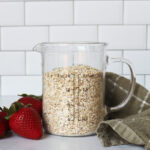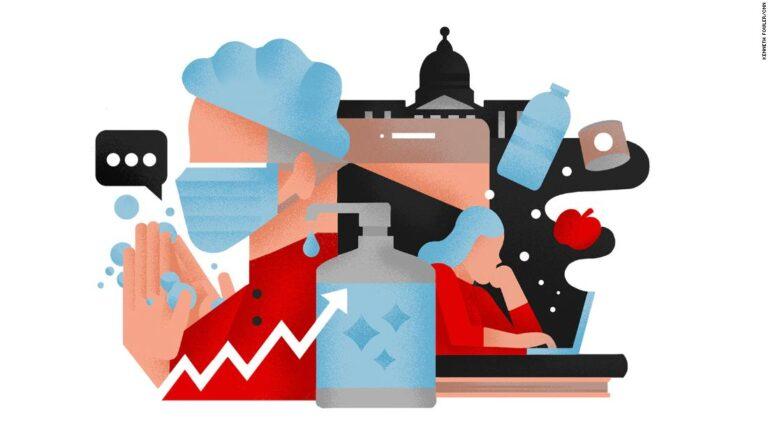Registered dietitians break down exactly why the two are so interconnected—and how to improve your gut health.
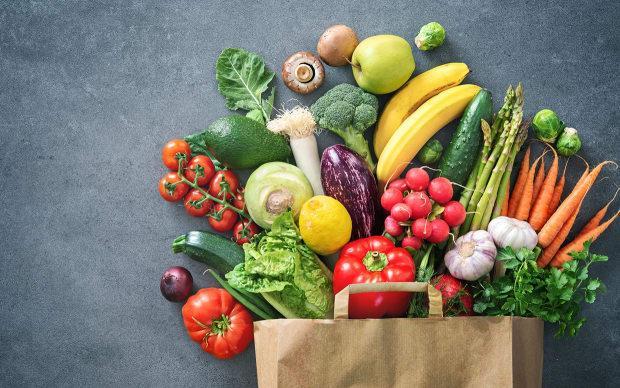
This article was medically reviewed by Camille Skoda, RDN at the Cleveland Clinic.
Many of us hear the word “bacteria” and we automatically think of infections. But most bacteria don’t cause any harm to humans, or they do only under certain conditions. Our gut microbiome—another word for environment—is composed of trillions of cells, including bacteria, fungi, viruses, and more. Every person has a unique microbiome and the bacteria in the microbiome play several roles. They protect your gut from harmful bacteria and they also break down food molecules so your body can convert them into fuel. Your overall health can influence your gut biome just as your gut biome can influence your overall health.
If you’re curious about how to improve your gut health, we’ve answered the tough questions about what you should know about the link between gut health and diet. Here’s what to keep in mind.
Why Is Your Gut Health Important?
Have you ever been so nervous that you couldn’t eat? Do you get butterflies in your stomach when you have to speak to a group of people or go somewhere you’ve never been before? Do you find yourself to the bathroom when you get stressed? As odd as it may sound, your gut is often referred to as your second brain. The human gut has more than 100 million nerve cells that not only tell your body when to release hormones related to digestion, they actually communicate with your brain. Your gut health affects this communication, and the effects of the brain connection can be even more obvious if you have a condition that affects your bowels, such as irritable bowel syndrome or Crohn’s disease.
Signs of an unhealthy gut vary between people, but the most common symptoms include:
- Gas
- Diarrhea
- Weight changes
- Difficulties with sleep
Gut Health Affects Your Whole Body
“Your diet, what you’re putting into your body, [is] what is going through your gut, so it has a direct impact on not just your gut microbiome, but also the integrity of your gut,” says Camille Skoda, RDN, LD, a dietitian at Cleveland Clinic Center for Functional Medicine. “This we know now is being linked to so many different diseases, not just bowel disorders, but also things like anxiety and .”
In a perfect world, we would eat whatever satisfied us and what we enjoyed. Our body would process the food as it passed through our gut, we would absorb the necessary nutrients, and what we don’t need is eliminated through our bowel movements. However, we don’t live in a perfect world and some foods can make us feel lousy, so many of us could probably adjust our diet in order to improve our gut health. This could reduce the risk of developing conditions directly related to the gut and elsewhere in the body.
“There are a lot of different tools and resources that we can use to evaluate your health as a whole,” says Ms. Skoda. “I usually start patients with some sort of elimination type diet, where you take out foods that are common sensitivities, and add them back in and see if any of them are causing any of those symptoms again.” Using some of the available tools, like journals, questionnaires, and apps, dietitians evaluate different symptoms and as suggest changes to your diet when necessary. For example, “if a patient is starting to increase the number of vegetables and add variety to their diet, we can track overall symptoms of things like fatigue, digestive symptoms, and see improvements or worsening of symptoms over time,” Ms. Skoda adds.
Another important thing to remember is unless you are drastically ill and need to make major changes quickly, it’s best to move slowly with your diet adjustments. People who make sweeping and sudden changes may find it hard to continue with their new diet because it’s changing too much too fast.
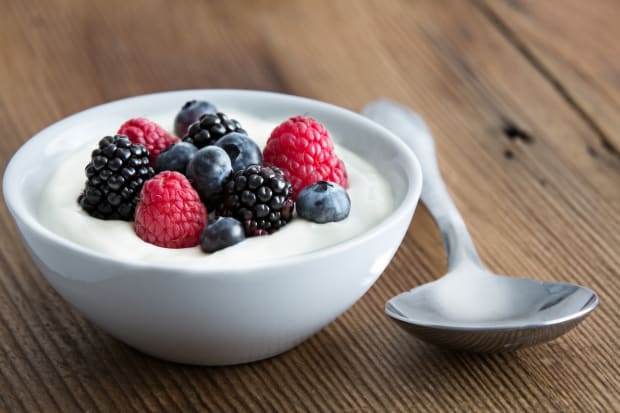
What are the best foods for gut health?
We’ve all heard the advice to eat more fiber, to stay hydrated and to eat regular meals. But there’s more to eating a gut-healthy diet. You may need to use some trial and error to find the foods that help you feel your best. For example, certain types of nuts are healthy, but some people have abdominal cramping after eating nuts, so this list should only be used as a guide, and not a definite list of must-eat foods.

What are the worst foods for gut health?
Processed and high-fat or high-sugar foods are not good for gut health. “We can’t really make the case for any benefits to added sugar. We can make a case that fruit is a great food group to keep in there, and there is natural sugar in fruit. But when it comes to things like cane sugar and high fructose syrup, those tend to drive up inflammation, especially in our gut, and can cause a lot of different symptoms,” Ms. Skoda explains. Other foods to avoid include:
- High fructose fruits: Apples, pears and mangos are high in fructose.
- Animal products: Eating some animal products in moderation may not bother you, but some people develop gut problems when they consume meat, dairy or eggs.
- Trans and hydrogenated fats: These are found in many baked goods, frozen foods and fried foods.
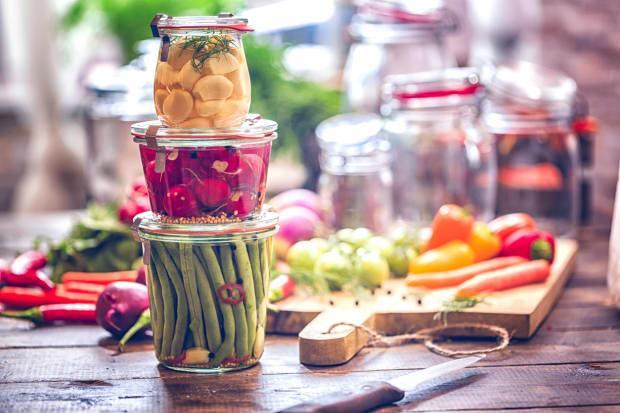
Are probiotics for gut health helpful?
Probiotics contain live yeast and bacteria that may be good for your gut. Yogurt is a popular probiotic food. Some fermented foods and drinks are also good sources of probiotics, such as kombucha, kefir, miso, tempeh, apple cider vinegar, pickles and sauerkraut. When possible, doctors recommend that their patients get their probiotics and other nutrients directly from their food rather than supplements alone.
If you’d like to add probiotics to your diet but you’re not used to consuming them, add them slowly. You may experience unpleasant abdominal effects if you go too quickly. Your gut will need to get used to the probiotics. If you choose to use a supplement, speak with your pharmacist about the best ones for you.
Other Tips to Improve Your Gut Health
If you are already eating a fairly healthy diet, you may just need to tweak it a bit. Ms. Skoda says that sometimes patients eat well but overdo it in some areas and have not quite enough in others. For example, if they’re eating all raw vegetables, they may need to try mixing in some different textures. “Cooked vegetables can be really helpful to impact your gut health. Or are they eating all cooked vegetables and maybe we need to work in some raw or some fruits to go with that.”
Eating a gut-healthy diet is the most obvious place to start improving your gut health, but there are other lifestyle issues that can affect your gut too. Getting enough sleep, reducing your stress and getting enough exercise also play a role. This brings in the brain/gut connection. You should also drink enough water so you stay hydrated—this helps your gut do its work. And eat slowly. If you rush your food and don’t chew it thoroughly, you make it harder for your gut to digest what you’re eating.
One last tip from Ms. Skoda is not to become too focused on what you eat, particularly if you have a history of food issues. She recommends that you not spend time tracking your food every day. “I usually recommend for my patients to pick a couple days out of the week to track, not to do it every single day,” she says. “That can become kind of taxing and you can burn out on it easily. I usually recommend picking two weekdays, one weekend day.” This gives you a general idea of how you’re doing.
It May Take Some Trial and Error
It may take a bit of trial and error to find the right gut-healthy foods for you. The important thing is to remember to take your time and not to consume too much of any one product. Moderation is key.
Find out what probiotics are, how to find them and how they can also play a role in improving your gut health.
Sources
- Camille Skoda, RDN, LD, dietitian at Cleveland Clinic Center for Functional Medicine
- Cleveland Clinic: “How to Pick the Best Probiotic for You”
View the original article to see embedded media.
This content was originally published here.









